-

新人教版高中英语必修3Unit 5 The Value of Money- Discovering Useful Structure教学设计
Step 3 Meaning1. 过去将来时表示从过去某一时间来看将要发生的动作或存在的状态, 常用在宾语从句中。一般由“would/should +动词原形”构成。She hoped that they would meet again someday. 她希望将来有一天他们能再见面。2. was/were going to+动词原形: 表示过去将要发生或很有可能发生的动作, 常用于口语中, 表示预言、意图或者打算等。He was going to start work the following week. 他打算下星期开始工作。3. was/were about to do: 常用来表示即将发生的动作, “刚要/正要做……”。注意该结构不与任何时间状语连用。I felt that something terrible was about to happen. 我感到某种可怕的事情即将发生。4.was/were to do: 表示“曾计划做某事”, 如果表示“本来计划做某事, 动作没实现”, 则需用 “was/were to have done”。She said she was to have told me about the accident. 她说她本来想告诉我关于事故的事。5.Start, go, come, leave, see, meet等动词的过去进行时: 表示就过去某一时刻而言即将发生的动作。She was coming later. 她随后就来。I had just put on my overcoat and was leaving to visit a friend of mine. 我刚穿上外套要去看我的一个朋友。

新人教版高中英语必修3Unit 5 The Value of Money-Listening &Speaking&Talking教学设计
4. A:We’d like to have someone to say a word at the beginning to welcome the group.B:↙Who?A:We thought that you or Dr.Johnson might do it.B用降调说Who,其意思是问,对方想让谁在开场时致欢迎词。Step 6 Pronunciation---Practice1. Listen to the short conversation and mark the intonation with ↗, ↙ or ↙, ↗. Then discuss with a partner what they intend to convey by using different intonation.Owner: You know what ?↗ It’s a million-pound bank note↙.Waiter 1: Really ?↗(question)Waiter 2: Really !↙(unbelievable and surprised)Waiter 3: Really ?!↙↗(first question then surprised)2. Listen to the conversations. Underline the parts that are stressed and mark the intonation. Then talk about the implied meanings of the responses with different intonations. Listen again and repeat.1) Henry: It’s a nice suit.Owner: Oh, it’s perfect!↙(The intonation means it is very suitable for Henry.)2) Henry: Well, that’s very kind of you.Owner: Kind, sir ?↗(what you said is not right) No, it’s kind of you. You must come whenever you want and have whatever you like. Just having you sit here is a great honour !!↙(welcome you to come again)3)Henry:Well, to be honest, I have none. Oliver:(happily) What luck!(excited) Brother↗, what luck!↙(It means “Didn’t you hear it?”)Henry: Well, it may seem lucky to you but not to me!↗(angry) If this is your idea of some kind of joke, I don’t think it’s very funny. Now if you’ll excuse me, I ought to be on my way.↙(If so, I would leave.)Roderick: Please don’t go↙...(hope Henry can wait for a moment)Part B Viewing and Talking---Describe people’s changing attitudes in a film clipStep 1 Before-listening---Tell the filmYou are going to watch part of the film The Million Pound Bank Note. Look at these photos and guess what happens in the film.

新人教版高中英语必修3Unit 5 The Value of Money-Listening &Speaking教学设计
Step 4: Listen again and decide if the following statements are true (T) or false (F).1 It was the first time Chen Liyan's story was reported. T口 F口2 Chen found 10,000 yuan in a small plastic bag in Taiyuan railway station口 F口3 Wang Zheng apologized to Chen because he couldn't offer her more money. T口 F口4 Chen took out a large loan to cure her daughter, T口 F口5 Wang set up a fundraising website for Chen's daughter after Chen told him about her situation. T口 F口Step 5:After listening, discuss the questions.1 What kind of person do you think Chen Liyan is?Chen Liyan is generous and honest because she returned a large sum of money to the owner.2 Did Chen return the money because she didn't need it?No. She returned the money because it was the right thing to do. Evidence for this is that she refused to accept the reward money because she felt that it had not been earned. 3 Is it common for people to do what Chen did?It depends on the culture. In some countries it is quite common to return money that has been found. In other countries, people believe "Finders are keepers!" 4 How did Wang Zheng feel about the return of his money?He must have been very happy and relieved to have gotten his money back. We know this because he thanked Chen repeatedly and even offered her a reward.5 Why did Ma Dongbao tell Wang about Chen's family?He must have had great sympathy for Chen and her daughter and wanted to help them.'We know this because he arranged help for them. 6 How did the news reporter feel about Chen's actions?The news reporter felt that it showed that money wasn't the most important thing in life. We know this because the reporter told us that this is what Chen believes. and then said, “that's a great attitude to take."

新人教版高中英语必修3Unit 5 The Value of Money-Reading and Thinking教学设计一
Everybody wants to get wealth.In today’s material world,making money or becoming wealthy symbolizes a person’s success and capability. Many people just make every effort, pay any price to attain greater wealth. With money,they can buy nice, large apartments in nice neighborhood. With money they can own luxurious cars. Wealth seems to bring all happiness in life.But is wealth the only road to happiness? Not really. There are many things in the world, which are beyond the means of money, such as friendship, love, health and knowledge. People are so preoccupied with struggling for money that they have no time or would not take the time to form or maintain friendship. What happiness can they feel living as lonely miserable creatures without love or friends in the world even if they accumulate tremendous wealth?In my opinion, people can’t do anything without money, but money is not everything. What money will bring you depends on your personal belief and goal in life. If you are kind enough to help others, especially the poor, money is a good thing to you. With it, you can do much more for the benefit of people and your country, and it will add to your own happiness. If you want money just for your own needs, you’ll never be satisfied or happy. In a word,you should have money spent for more people. Only then can money be the source of your happiness.Step 8 Homework4 students in a group, one acts Roderick, one Oliver, one servant and the fourth one acts Henry Adams, then listen to the tape, pay more attention to the difference between American English and British English in pronunciation, stress, tone.

新人教版高中英语必修3Unit 5 The value of money-Reading and Thinking教学设计二
? Could you offer me some kind of work here?? I don’t want your charity, I just want an honest job.? Careless: I landed in Britain by accident.Step 7:Consolidation.? Find Henry? Roderick and Oliver were I .making a bet when they saw Henry, a poor young man. ? Know Henry? About a month ago, Henry was sailing and later he found himself carried out to sea by a strong wind. Fortunately, he 2.was spotted by a ship. And it was the ship that brought him to 3.England? Offer money to Henry ? Oliver and Roderick gave Henry a letter and told him that there was money in it. They 4.persuaded him to accept it, and made him 5.promise that it wouldn't be opened until 2 o'clock.Step 8:Language pointsa large amount of: a large quantity of; a great deal ofe.g. They bought a large amount of furniture before they moved their new house.make a bet: make an arrangement to risk money, etc. on an event of which the result is doubtful.e.g. We made a bet on the result of the match.permit sb to do something: allow somebody to do somethinge.g. My mother doesn’t permit me to ride in the street after it rained.by accident: as a result of chancee.g. I only found it by accident.stare at: look at somebody or something with the eyes wide open in a fixed gaze( in astonishment, wonder, fear, etc)to be honest: to tell you the truth; to be franke.g. To be honest, I don’t think we have a chance of winning.Step7 Homework:What do you think will happen to Henry? Will the bank-note help him or get him into trouble?

新人教版高中英语必修3Unit 5 the value of money-Reading For Writing教学设计一
【参考范文】Narrator:(Henry is smiling as he leaves the restaurant. As he is walking down the street, he sees a sign for a place that cuts hair. He decides to get it cut. )H=Henry;B=Barber;R=rude manH:Good afternoon, I'd like to get a cut, if I may. (The barber looks at Henry's hair and continues cutting another man's hair. )Er, I'd really like a haircut. As you can see it's much too long. B:(in a rude manner) Yes, I can see that. Indeed, I can. H:Fine, well I'll have a seat then. (He sits in one of the barber's chairs. The barber turns to look at Henry. )B:It's quite expensive here, you know!Are you sure you can afford it?H:Yes. I think so. (In comes the rude man. )R:Hey you there. I need a haircut quickly. Can you do me straightaway?B:All right, then, get in the chair and I'll see what I can do. R:Thank you. (sits down in one of the barber's chairs)H:Excuse me, but I was here first. Aren't you going to do my hair first?B:This man's in a hurry. H:Well so am I!I insist that you cut my hair first. B:OK, but I'll have to be quick. This gentleman is waiting. H:Thank you. (They both become quiet. After his hair is cut, the barber tells Henry how much he must pay. Henry shows the barber the bank note. )B:Why, Mr . . . (looks shocked)H:Adams. Henry Adams. I'm sorry, I don't have any change. R:You're that Mr Adams! Well,I'm glad I waited or I might never have known it was you. B:Why, Mr Adams, please don't worry!(wearing a big smile) Nothing to worry about!Nothing at all!Please come back any time, even if you only need too little hairs cut!It will be my honour to serve you!
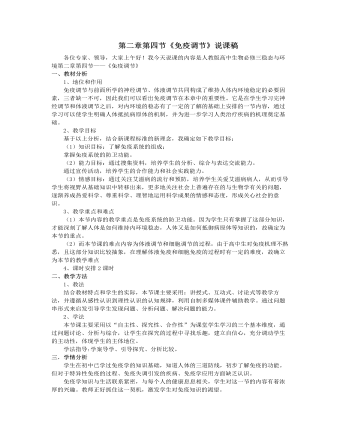
人教版高中生物必修3第二章第四节《免疫调节》说课稿
(四)、活动交流,体验科学通过资料分析讨论以下三个问题:1、你知道爱滋病的传播途径吗?2、如何预防爱滋病?3、我们应如何对待爱滋病患者?面对艾滋病我们能做些什么?从而进入情感态度的教育。除此之外,我还设计一个开放性的作业“向全社会为关注艾滋病设计一个宣传广告”(形式不限,漫画、板书、倡议书等),让学生把爱心付诸于实际行动。在此基础上引出“免疫学的应用”从免疫预防、免疫治疗、器官移植三个方面讲述,让学生充分体验到知识和社会生活的紧密联系,让他们不在感到科学是那么的遥远,而是可爱的有用的。通过交流,让同学们体会到合作的魅力和重要性,进一步培养合作意识和合作能力。最后我设计一个资料搜集,让同学们选一个感兴趣的主题利用电脑在网上搜集有关资料。主题:1、你知道世界艾滋病日吗?历年的主题是什么?开展世界艾滋病运动有什么意义?
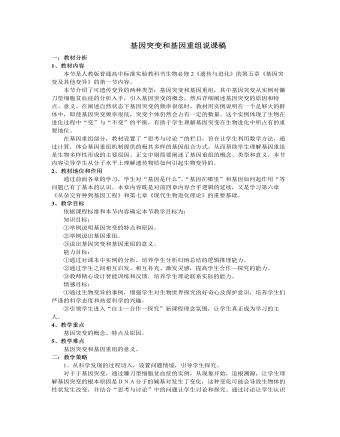
人教版高中生物必修2基因突变和基因重组说课稿
1、教材内容本节是人教版普通高中标准实验教科书生物必修2《遗传与进化》的第五章《基因突变及其他变异》的第一节内容。本节介绍了可遗传变异的两种类型:基因突变和基因重组,其中基因突变从实例对镰刀型细胞贫血症的分析入手,引入基因突变的概念,然后详细阐述基因突变的原因和特点、意义。在阐述自然状态下基因突变的频率很低时,教材用实例说明在一个足够大的群体中,即使基因突变频率很低,突变个体仍然会占有一定的数量。这个实例体现了生物在进化过程中“变”与“不变”的平衡,有助于学生理解基因突变在生物进化中所占有的重要地位。在基因重组部分,教材设置了“思考与讨论“的栏目,旨在让学生利用数学方法,通过计算,体会基因重组机制提供的极其多样的基因组合方式,从而帮助学生理解基因重组是生物多样性形成的主要原因。正文中则简要阐述了基因重组的概念、类型和意义。本节内容引导学生从分子水平上理解遗传物质如何引起生物变异的。
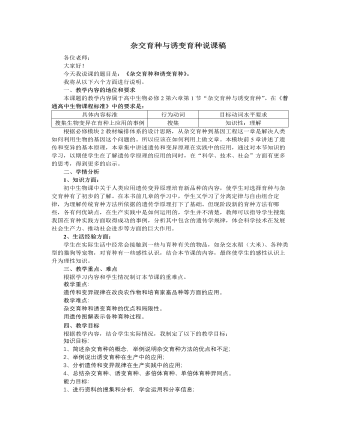
人教版高中生物必修2杂交育种与诱变育种说课稿
二、诱变育种1、创设情境,引出课题 出示教具或图片:一穗具有黄粒性状的玉米。问题:怎样利用现有的玉米品种培育出具有黑色性状的玉米新品种呢?2、阅读资料、讨论研究 课前布置兴趣小组同学搜集有关航天诱变育种的资料,并在此基础上进行整理。这样可以培养学生搜集并且整理资料的能力,并体会科学技术与人们生产生活的密切联系。 学生阅读生物兴趣小组课前搜集的有关航天诱变育种问题的资料及教材P100得内容。以小组为单位讨论回答有关诱变育种的有关问题,附:设置的问题:1、 新品种中有没有产生新基因?2、空中诱发基因突变的条件有哪些?3、航天诱变育种有哪些优点?4、地面上有哪些因素可以诱发生物体产生基因突变?5、诱变育种有哪些局限性?如何克服?以航天诱变育种为典型,解决诱变育种过程中遇到的相关问题。让学生学会对已有知识进行应用。3、归纳总结,形成体系 通过以小组为单位的表达和交流,师生共同总结归纳,形成有关诱变育种的知识体系,提升学生对于知识的理解。
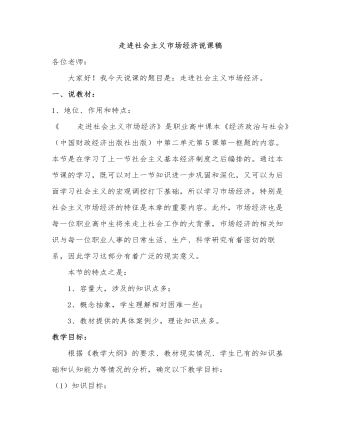
人教版高中政治必修1走进社会主义市场经济说课稿
四、教学过程:(一)、课题引入:教师创设问题情景(创设情景:使用多媒体模拟一些比较有趣、与生活实践比较有关的事,并提出问题。)激发学生的探究欲望,引导学生提出接下去要研究的问题。(二)、新课教学:1、针对上面提出的问题,安排学生分组讨论,让学生通合作学习探索有关的知识,并进一步引出下面要解决的问题。2、组织学生进行新问题的探究学习,设计上最好是有对比性、通过多媒体的辅助,由学生分析比较,归纳总结出知识的结构。(三)、实施反馈:1、设计相关习题达到对学过的知识的检测和巩固;2、课堂反馈,迁移知识(最好迁移到与生活有关的例子)。让学生分析有关的问题,实现知识的升华、实现学生的再次创新。五、板书设计:在教学中我把黑板分为两大部分,左边是第一部分,各知识点罗列其下,第二部分写在右边,各知识点罗列其下。
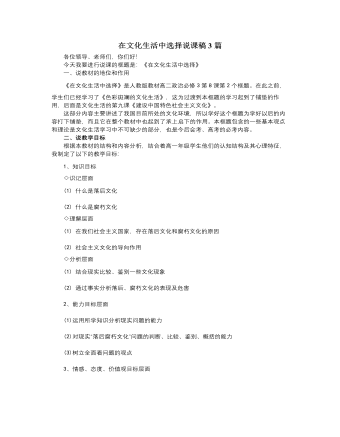
人教版高中政治必修3在文化生活中选择说课稿3篇
生2:每逢清明,或其他一些死者的纪念日,人们总要为死去的亲人烧纸钱。这幅漫画由烧纸钱演变为烧“家电”,说明随着社会环境的变化,人们根深蒂固的一些封建思想,还在影响着人们的生活。要花大力气去破除封建迷信活动。师:说到底,算命、烧纸钱是封建迷信活动,从文化角度来说,是落后文化。我们一起来看看在现实生活中,还有哪些落后文化在影响着人们的生活。生1:在一些边远落后地区,大人小孩生了病,不是看医生,而是让巫婆神汉来治,结果往往耽误了诊疗时间,有的甚至还丢掉了性命。生2:“重男轻女”“多子多福”,红白事大操大办现象在有些地方还很严重。师:这些落后文化都有哪些共同特征?在你看来,这些现象有哪些危害?生3:这些落后文化,在内容上带有迷信、愚昧、颓废、庸俗等色彩,在形式上常常以传统习俗的形式表现出来,如人们常见的看相、算命、测字、看风水等。它会麻痹人的意志,使人消极、悲观、绝望,对理想、前途、信念丧失信心;破坏社会的风气。
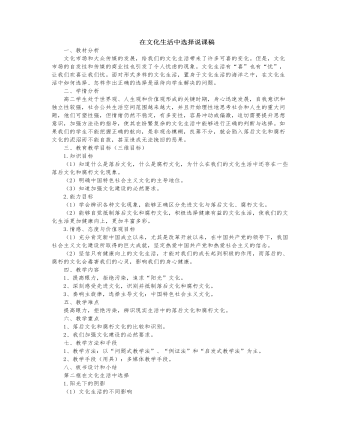
人教版高中政治必修3在文化生活中选择说课稿
一、教材分析文化市场和大众传媒的发展,给我们的文化生活带来了许多可喜的变化。但是,文化市场的自发性和传媒的商业性也引发了令人忧虑的现象。文化生活有“喜”也有“忧”,让我们欢喜让我们忧。面对形式多样的文化生活,置身于文化生活的海洋之中,在文化生活中如何选择、怎样作出正确的选择是亟待向学生解决的问题。二、学情分析高二学生处于世界观、人生观和价值观形成的关键时期,身心迅速发展,自我意识和独立性较强,社会公共生活空间范围越来越大,并且开始理性地思考社会和人生的重大问题,他们可塑性强,但情绪仍然不稳定,有多变性,容易冲动或偏激,迫切需要提升思想意识,加强方法论的指导,使其在纷繁复杂的文化生活中能够进行正确的判断与选择。如果我们的学生不能把握正确的航向,是非观念模糊,良莠不分,就会陷入落后文化和腐朽文化的泥沼而不能自拔,甚至造成无法挽回的恶果。
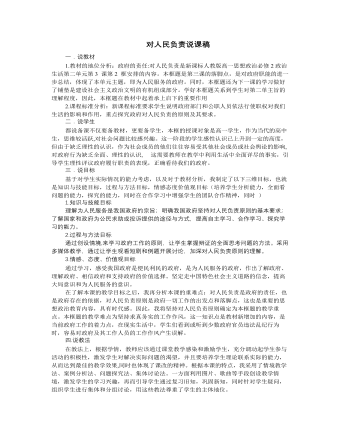
人教版高中政治必修2对人民负责说课稿
在学生活动的基础上,教师总结归纳:要坚持从群众中来到群众中去的工作方法。要求:政府要通过各种途径,利用各种群众组织、社会团体广泛收集群众意见和建议,认真对待群众的来信来访。还要为群众诚心诚意办实事,尽心竭力解难事,坚持不懈。通过合作探究,以此来培养学生的分析能力,探究能力以及透过现象看本质的能力,培养学生获取信息的能力,自主学习的能力以及全面看问题的能力,再结合教师的讲授,给学生一种茅塞顿开的感觉。环节四 回归生活 提升情感我将引导学生阅读课本,通过设置活动探究课,结合生活实际从时效,便利,实效等方面请学生评述公民求助或投诉的四种方式的特点和优点。在这一过程中,我还会用多媒体展示常用的热线电话,政府网站上有关信访、政务公开及其他便民利民的栏目,丰富课堂资源。让学生阅读课本,自行归纳知识点,有助于培养学生自主学习能力。
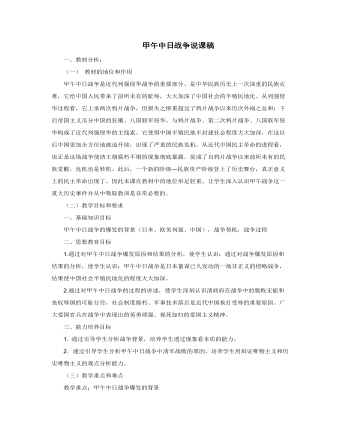
人教版高中历史必修1甲午中日战争说课稿
3.甲午中日战争中国战败的原因 对于“中国战败的原因”这一难点的突破,主要通过设置问题“中国之败败在实力逊于日本吗?”通过幻灯片全方位分析其实中国的综合国力当时是强于日本的。并且在战前,日本毫无取胜的把握。让学生结合刚学习过的战争原因和经过进行讨论,从多方面分析中国战败的原因。经过讨论,学生可以得出以下结论:避战自保方针,没有积极备战,将领临阵脱逃,教师肯定并总结答案进行补充。中日对比:中国士兵出身农民,军事训练落后,散兵游勇;日本士兵出身武士,训练有素;中国将领大多临阵脱逃,并相互猜忌,受当时恶劣的官风影响;李鸿章深知北洋海军实情,缺乏军费,军备废弛。为政治资本奉行避战自保政策,慈禧太后挪用海军军费过寿,支持李鸿章。使中方处于被动的局面,一再贻误战机。而日本在天皇的带动下,全民备战,做了充分的战争准备。
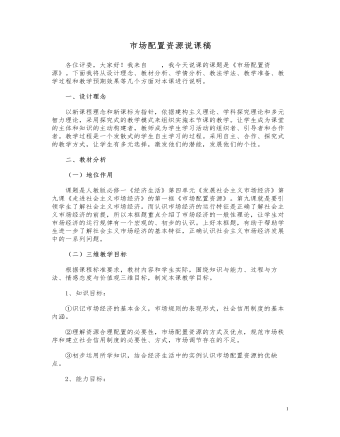
人教版高中政治必修1市场配置资源说课稿
(2)、市场调节存在固有的弊端:自发性:由于市场调节是在价值规律自发作用下进行的,在利益驱动下会产生一些违反市场原则的行为,如制造、销售假冒伪劣商品,大量排放废水、废气破坏环境,窃取他人智力成果等等。盲目性:由于人们不可能完全掌握生产各方面信息及其变化趋势,致使决策带有一定的盲目性。如某种商品有利可图则一哄而上,反之则一哄而退,从而造成资源浪费和消费得不到充分满足。滞后性:由于市场价格的形成和传递有一个过程,一旦传递到生产经营者手中进行生产调整,就有一个时间差,致使市场调节带有滞后性,成为一种事后调节。教师活动:请同学们想一想,市场的这些弊端和不足,会导致什么后果?(3)、危害教师总结:资源浪费,经济波动与混乱,分配不公两极分化等。设计意图:通过创设情景,加深对市场调节局限性的理解;要求学生结合生活实例探讨其弊端有助于加强对其产生原因和表现的记忆和理解。
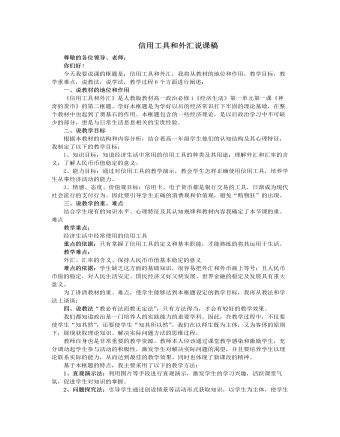
人教版高中政治必修1信用工具和外汇说课稿
一、对教材内容的处理根据新课程标准的要求、知识的跨度、学生的认知水平,我对教材内容有增有减。二、教学策略的选用(一)运用了模拟活动,强化学生的生活体验,本框题知识所对应的经济现象,学生已具有了一定的生活体验,但是缺乏对这种体验的深入思考。因此在进一步强化这种体验的过程中进行了思考和认知,使知识从学生的生活体验中来,从学生的思考探究中来,有助于提高学生的兴趣,有助于充分调动学生现有的知识,培养学生的各种能力,也有助于实现理论知识与实际生活的交融。(二)组织学生探究知识并形成新的知识我从学生的生活体验入手,运用案例等形式创设情境呈现问题,使学生在自主探索、合作交流的过程中,发现问题、分析问题、解决问题,在问题的分析与解决中主动构建知识。也正是由于这些认识来自于学生自身的体验,因此学生不仅“懂”了,而且“信”了。从内心上认同这些观点,进而能够主动地内化为自己的情感、态度、价值观,并融入到实践活动中去,有助于实现知、行、信的统一。
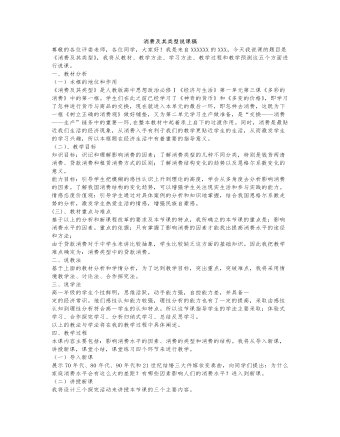
人教版高中政治必修1消费及其类型说课稿
(三)课堂小结接着进行课堂小结,先让学生自主总结,教师结合学生的总结,补充完善总结本节课的知识。并进行感情升华。这样设计课堂小结,是为了让学生学会自主总结知识,加深印象,教师总结帮助学生理清本课知识结构,并起到升华本节课的感情基调,落实教学目标。(四)课堂练习我将设计两道题让同学们做,巩固课堂知识。本课题板书设计我主要采用大纲的形式展现,让学生一目了然,便于识记和理解主干知识。五、教学预测最后我对本节课教学的效果进行预测:在这个教学过程中我都是从学生生活中感知的现象入手,设计情境,预设学生的分析,学生的体验,学生的感知,教师的点拨等。设计问题,学生自主合作探究,完成教学!通过这样的学习我想一定会收到较好的教学效果,当然,在实际的教学中,肯定也会出现一些意想不到的情况,我还会根据教学过程中的动态变化,及时地调整和修改预设内容。
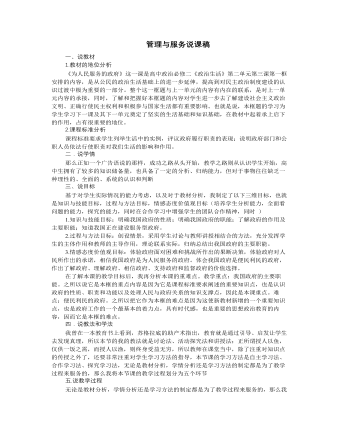
人教版高中政治必修2管理与服务说课稿
环节四 课堂小结 巩固知识本节课我采用线索性的板书,整个知识结构一目了然,为了充分发挥学生在课堂的主体地位,我将课堂小结交由学生完成,请学生根据课堂学习的内容,结合我的板书设计来进行小结,以此来帮助教师在第一时间掌握学生学习信息的反馈,同时培养学生归纳分析能力、概括能力。环节五 情景回归,情感升华我的实习指导老师告诉过我们,政治这一门学科要从生活中来到生活去,所以在课堂的最后布置了课外探究题,以此培养学生对理论的实际运用能力,同时检验他们对知识的真正掌握情况,以此达到情感的升华,本节课,我根据建构主义理论,强调学生是学习的中心,学生是知识意义的主动建构者,是信息加工的主体,要强调学生在课堂中的参与性、以及探究性,不仅让他们懂得知识,更让他们相信知识,并且将知识融入到实践当中去,最终达到知、情、意、行的统一。
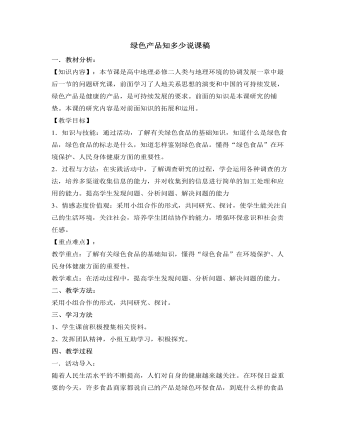
人教版高中地理必修2绿色产品知多少说课稿
各小组派代表汇报。4、教师提出问题组织学生讨论:⑴要想了解更多的绿色食品,了解绿色食品的销售情况,我们应该怎么做?⑵要想了解广大消费者对绿色食品的态度,食用绿色食品的意义,是否懂得辨认绿色食品,以及什么样的人群对此知识最缺乏等,我们应该怎么做?组织学生汇报交流。5、做个“绿色食品”广告设计师。为你喜欢的绿色食品设计广告语,每组推荐一个。6、让学生了解绿色食品认证程序。7、绿色食品打“假”队员在行动。8、向学生介绍生态绿色食品基地。三、活动总结:通过研究、探讨,了解学生对绿色食品的态度。提问:民以食为天,吃,是一个大问题,如果你的爸爸妈妈让你到超市买牛奶、方便面等,你会选择什么样的食品?为什么?希望通过今天的学习,同学们能够做到绿色消费,也希望你们向自己的家人、向周围的了解学生对“无公害食品”、“有机食品”与“绿色食品”的认识。

人教版高中历史必修3启蒙运动说课稿
教材地位本课具有承上启下的作用,前承文艺复兴,后启资产阶级革命时代的到来,启蒙运动为资本主义社会构建了一套政治蓝图,具有前瞻性,是近代第二次思想解放运动。因此,本节内容在整个教材中有着很重要的地位。教学目标1、知识目标:(1)帮助学生了解启蒙运动的性质、内容和主要启蒙 思想家及其主张。(2)理解启蒙运动兴起的背景、影响。2、能力目标:(1)在讨论和探究过程中训练学生的科学思维方法和自主学习的能力和掌握解题的方法。(2)通过指导学生阅读启蒙思想家的言论资料,培养学生对历史资料的理解和归纳能力。3、情感价值目标:(1)培养人文意识,强化法治观念。(2)培养学生的团结协作精神和竞争意识。教学重点、难点(1)教学重点:启蒙思想家的主张及启蒙运动的影响。